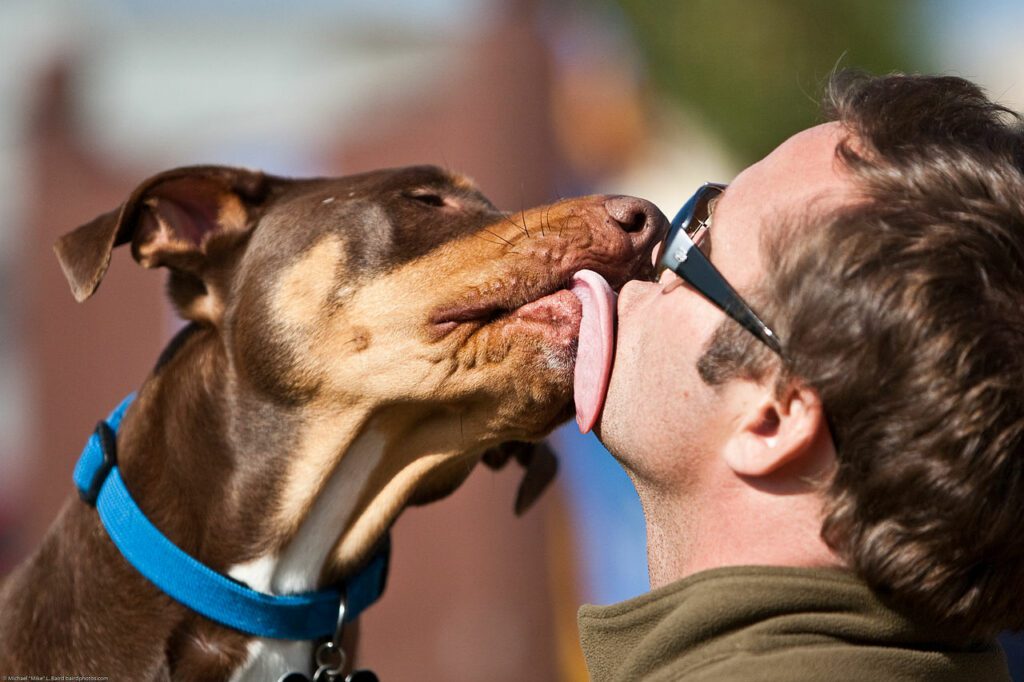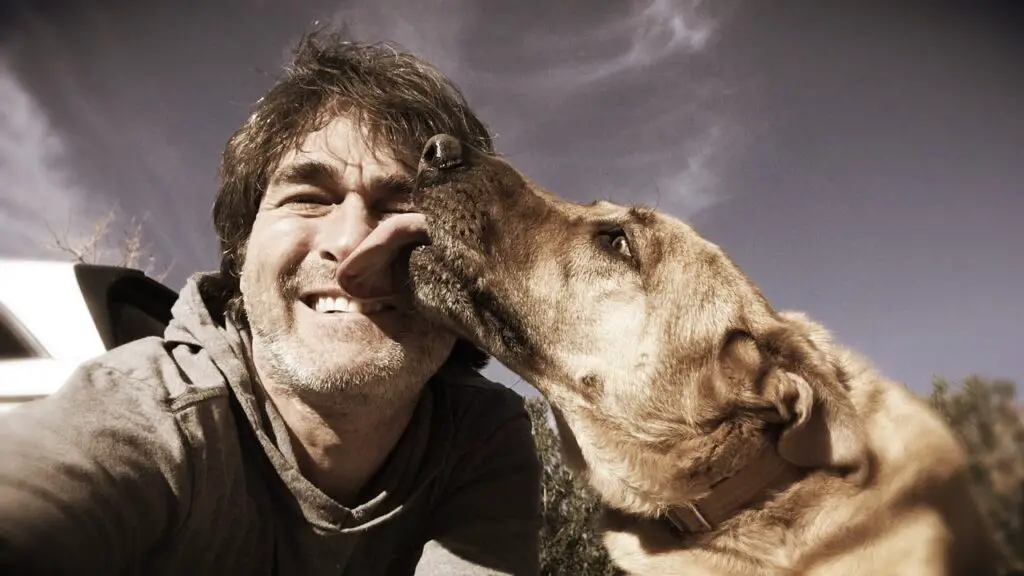Have you ever wondered if your beloved canine companion could be the reason behind those pesky breakouts on your skin?
The question of whether dogs cause acne has been a topic of debate and curiosity for many pet owners.
In this article, we will investigate the potential link between dogs and acne, uncovering the truth behind this common myth.
By examining the factors that may contribute to skin issues and exploring scientific evidence, we aim to provide clarity on how your furry friend might be affecting your complexion.
Key Takeaway
- Dogs do not cause acne in humans; while dogs can have their own form of acne, it is typically not transferable to humans.
- While can cause skin reactions in some individuals, such as red bumps or pustules, they generally do not directly cause acne breakouts in humans.
- Dog saliva does not directly cause acne in humans, but it can exacerbate existing acne conditions.
Do Dogs Cause Acne?

No. While it’s possible to get bacterial infections, parvovirus, or heartworms from your pet, pimples in dogs are due to inflammation in the lips or skin which begins as folliculitis and not from any contact with humans.
Acne is a skin condition caused by overactive oil glands in the skin. Though there are several factors that can contribute to an increase in oil production and ultimately lead to breakouts, having a dog around is not one of them.
That being said, it’s possible that your pet’s fur or saliva could irritate your skin if you have sensitive skin and allergies.
In this case, it’s best to bathe your dog regularly and groom it often to reduce any potential irritants (such as pollen or dander) from getting on your face or body.
Can Dogs Make Your Skin Break Out?

No, dogs cannot make your skin break out. People can be allergic to dogs due to dander and saliva allergens, but these typically cause an itchy rash rather than acne-like lesions.
Additionally, some people may experience contact dermatitis from touching a dog’s fur or skin.
This is caused by an irritation to the proteins in the dog’s fur or saliva which may result in a red, itchy rash that sometimes looks like acne.
However, this is not true acne and should clear up after avoiding contact with the dog. If you think you may have an allergy to your pet, talk to your doctor for guidance on how best to manage it.
Does Dog Saliva Cause Acne?
There is no scientific evidence to support the idea that dog saliva causes acne in humans.
While it is true that saliva contains proteins, hormones, and other compounds, the concentration of these substances in a dog’s saliva is not enough to trigger an acne outbreak.
Additionally, there has been no research linking dog saliva directly with acne.
However, if you are particularly prone to breakouts or have sensitive skin, contact with your pet’s fur or saliva could potentially aggravate your existing condition and worsen any pimples you already have.
It is therefore important to take steps to minimize contact with your pet’s fur and saliva by washing your hands after handling them and regularly cleaning their bedding.
Can Animal Fur Cause Acne?
Yes, animal fur can cause acne. While snuggling with your pet may be comforting, unfortunately, their fur can have an effect on our skin and cause acne.
The most common type of acne in pets is canine acne, which is an inflammatory disorder of the lips and skin of the muzzle.
Dogs with mild cases of acne often have red bumps or pustules (pimples) on their skin. Feline acne manifests itself as small bumps accompanied by blackheads or whiteheads, similar to humans.
To prevent pet-induced acne, there are a few precautions you can take.
Bathe your pet a few times a month and don’t forget about oral hygiene; brushing your pet’s teeth regularly will help keep their skin clear too.
Natural treatments like herbal antibiotic creams, aloe vera, or coconut oil can also soothe inflammation and help clear away acne (just make sure that whatever you use is safe for your pet).
Can Pets Cause Skin Problems?
Yes, pets can cause skin problems. Allergies to pet dander, saliva, and urine are very common and can manifest in the form of rashes or other irritations on the skin.
Additionally, pets often carry parasites like fleas and ticks that can cause skin irritation and infections if not treated properly.
In some cases, pets may even bring in external allergens from outdoors that could worsen existing skin conditions.
Pet owners should watch for signs of a potential skin problem due to allergies or parasites and seek the appropriate medical attention as soon as possible.
Proper hygiene practices such as regular bathing of your pet with vet-recommended products can help reduce exposure to these external elements that could contribute to skin issues.
Why Do I Break Out After My Dog Licks My Face?
It’s possible that you may be having an allergic reaction to the saliva of your dog, especially if it’s a breed with a rough tongue.
While not everyone experiences an allergic reaction when their pet licks their face, some people can have an adverse immune response.
In addition, oils from your pet’s fur and skin can also cause irritation and lead to breakouts.
If you believe this is the case for you, it’s best to avoid contact between your face and your dog’s mouth as much as possible.
Is It OK To Let a Dog Lick Your Face?
No. Though it may seem cute and harmless, letting your dog lick your face can have serious consequences for both you and your pet.
Your dog’s mouth contains bacteria that, while generally harmless to them, may cause illness in humans. In addition, some dogs carry contagious diseases such as rabies or giardia.
If your pet has recently been around other animals that could be carrying these illnesses, then licking your face could put you at risk.
FAQs
Q: Can dogs cause acne in humans?
A: No, dogs do not cause acne in humans. Acne is primarily caused by hormonal changes, excess oil production, and bacteria on the skin. It is not caused by contact with dogs or any other animals.
Q: Can dogs get acne?
A: Yes, dogs can get acne. It is more common in certain breeds with short hair, such as boxers and bulldogs. Canine acne is usually caused by a combination of factors, including excess oil production, bacteria, and skin irritation.
Q: How is canine acne treated?
A: Mild cases of canine acne can often be treated at home by gently cleaning the affected area with an antibacterial soap and applying a topical acne treatment recommended by a veterinarian. In severe cases, oral antibiotics may be prescribed.
Q: Is canine acne contagious?
A: No, canine acne is not contagious. It cannot be spread to other dogs or humans. However, if your dog has acne, it is best to avoid touching the affected area to prevent further irritation or infection.
Q: Can I use human acne products on my dog?
A: No, you should never use human acne products on your dog. These products are formulated for human skin and can contain ingredients that are toxic or irritating to dogs. Always consult with a veterinarian for appropriate canine acne treatments.
Q: Can dog allergies cause acne-like symptoms?
A: Yes, dog allergies can sometimes cause skin conditions that resemble acne in humans. These conditions may include redness, bumps, and itchiness. If your dog is experiencing skin issues, it is best to consult with a veterinarian for proper diagnosis and treatment.
Q: Are there any breeds that are more prone to acne?
A: Yes, certain dog breeds are more prone to developing acne due to their skin and coat characteristics. Breeds like boxers, bulldogs, and pugs are more commonly affected by canine acne. However, any dog can potentially develop acne.
Q: Can dog food contribute to acne in dogs?
A: Yes, poor quality dog food or a diet that is not suitable for your dog’s specific needs can contribute to the development of acne in dogs. It is important to feed your dog a balanced and nutritious diet to maintain overall health, including skin health.
Q: Is it necessary to seek veterinary care for canine acne?
A: Mild cases of canine acne may resolve on their own or with simple at-home treatments. However, if the acne is severe, persistent, or causing discomfort to your dog, it is advisable to seek veterinary care to ensure proper diagnosis and appropriate treatment.
Q: Can stress cause acne in dogs?
A: Yes, just like in humans, stress can contribute to the development or worsening of acne in dogs. Stress can disrupt the balance of hormones and increase oil production in the skin, leading to acne. Providing a calm and stress-free environment for your dog can help prevent acne flare-ups.
In Conclusion
While the link between dogs and acne may not be as direct as some believe, it is crucial to maintain proper hygiene and care when interacting with your furry friends.
By understanding the factors that contribute to skin issues and taking necessary precautions, you can enjoy the companionship of your canine pal without compromising your skin health.
Keep in mind that individual reactions and sensitivities may vary, so always pay attention to how your skin responds and consult a dermatologist if you have concerns.
Ultimately, with the right care and attention, you and your dog can continue to share a happy and healthy bond.





Leave a Reply